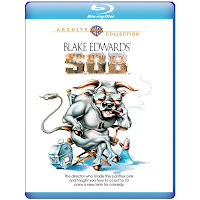the traveler's resource guide to festivals & films
a FestivalTravelNetwork.com site
part of Insider Media llc.
Reviews
March '17 Digital Week III
- Details
- Parent Category: Film and the Arts
- Category: Reviews
- Published on Wednesday, 22 March 2017 02:57
- Written by Kevin Filipski
Demon Seed
The Valley of Gwangi
(Warner Archive)
(Olive)
Richard Wagner’s early opera Das Liebesverbot—an adaptation of Measure for Measure—is nothing like his later canonical works, but it’s entertaining and holds the stage, even in last year’s messy Madrid staging by director Kasper Holten.
Best known as a 12-tone composer, Arnold Schoenberg wrote the lushly romantic Gurre-Lieder for large orchestra, soloists and chorus: but this cantata should not be turned into an opera (of sorts) with its love triangle “plot” enacted onstage, however cleverly director Pierre Audi did it in Amsterdam. On both discs, hi-def video and audio look and sound great. The lone Gurre-Lieder extra is a behind-the-scenes featurette.
Piotr Anderszewski Plays Greats of Mozart & Chopin at Carnegie Hall
- Details
- Parent Category: Film and the Arts
- Category: Reviews
- Published on Monday, 20 March 2017 15:06
- Written by Jack Angstreich

Piotr Anderszewski
On Friday, February 17th at a packed house at Carnegie Hall's Stern Auditorium, the extraordinary piano virtuoso, Piotr Anderszewski, gave what will surely prove to be one of the strongest recitals of the current concert season. The composers on the program—all titans—were amongst those whose work he is most closely associated, but a wonderful feature of the evening was the relative unfamiliarity of the repertory.
Anderszewski opened with an exquisite account of Wolfgang Amadeus Mozart's sublime Opus 11: the lovely Fantasia in C Minor, K. 457, followed with barely a pause by the remarkable Sonata in C Minor, K. 457, with the playing of both works characterized by an unusual delicacy.
The pianist, who is half-Polish, has had a special relationship with the music of his country and has been a great promoter of the works of Karol Szymanowski—several of whose works he presented at Carnegie Hall in a memorable series of concerts a few years ago—as well as the most celebrated of Polish composers, Frédéric Chopin, here represented by the introspective Polonaise-fantaisiein A-flat Major, Op. 61, sensitively rendered by Anderszewski.
The second half of the program opened with more Chopin, the beautiful Three Mazurkas, Op. 59, performed with characteristic aplomb. Chopin proved to be the fulcrum of the recital in more ways than one as his works were bookended by those of his two favorite composers, i.e., Mozart and Johann Sebastian Bach, whose glorious English Suite No. 6 in D Minor, brilliantly executed by the pianist, was to end the evening. Enthusiastic applause, however, elicited an outstanding encore, the three exquisite Bagatelles of Ludwig van Beethoven's Opus 126, providing a perfect finish for a phenomenal program.
Movie review—Hirokazu Kore-eda’s “After the Storm”
- Details
- Parent Category: Film and the Arts
- Category: Reviews
- Published on Monday, 20 March 2017 01:56
- Written by Kevin Filipski
 |
| Hirokazu Kore-eda's After the Storm |
Broadway Review—Arthur Miller’s “The Price”
- Details
- Parent Category: Film and the Arts
- Category: Reviews
- Published on Saturday, 18 March 2017 02:47
- Written by Kevin Filipski
 |
| Danny DeVito, Mark Ruffalo and Tony Shaloub in Arthur Miller's The Price (photo: Joan Marcus) |
More Articles...
Newsletter Sign Up
















